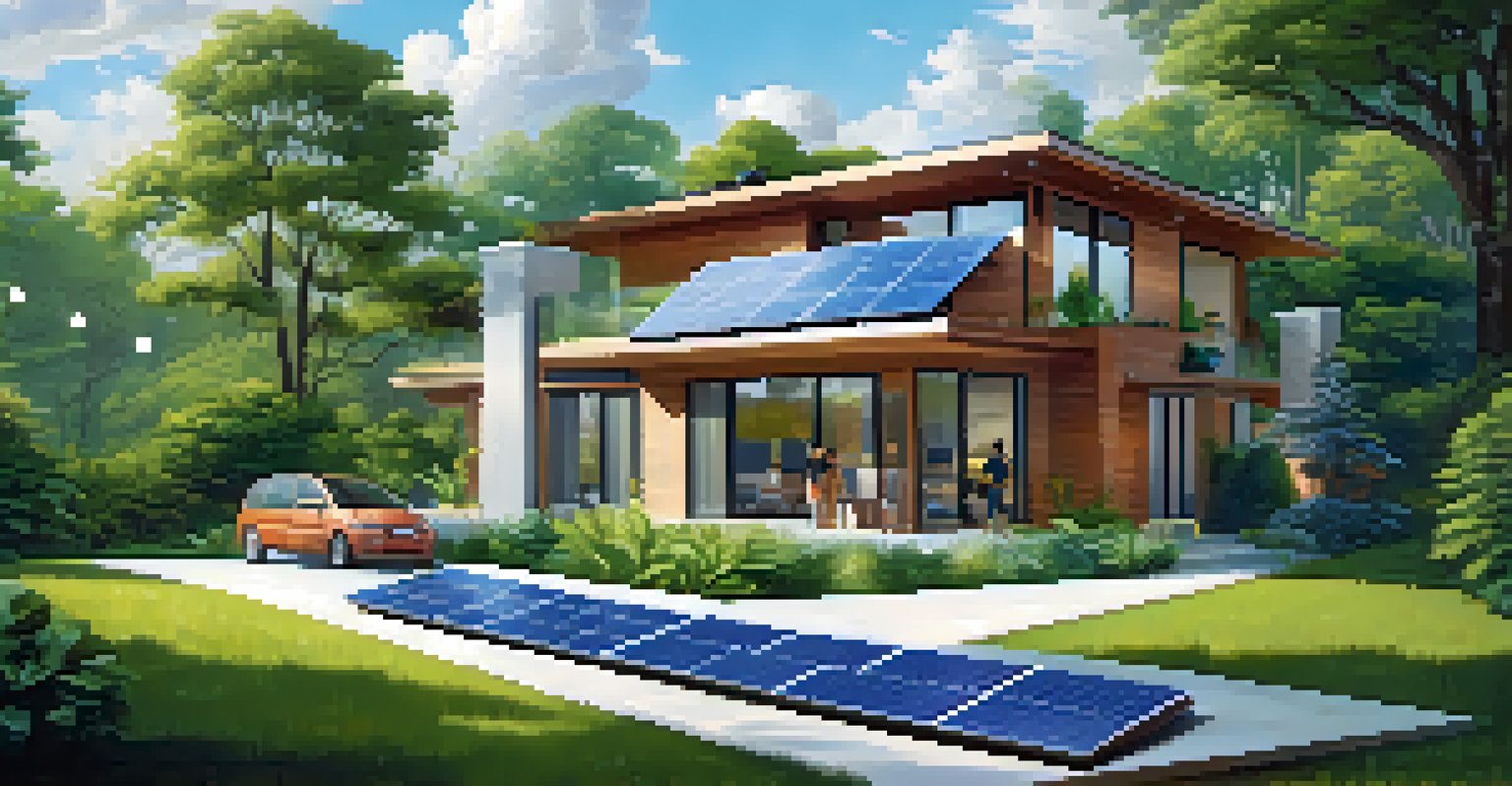Maximizing Tax Deductions: Energy-Efficient Home Improvements

Understanding Tax Deductions for Energy Efficiency
Tax deductions can significantly reduce your taxable income, and when it comes to energy-efficient home improvements, they can be a game changer. These deductions are designed to encourage homeowners to invest in upgrades that not only save energy but also contribute to a healthier environment. By understanding how these deductions work, you can make informed decisions that benefit both your wallet and the planet.
Investing in energy efficiency is not just about saving money; it's about creating a sustainable future for generations to come.
For instance, qualifying improvements can include anything from insulation upgrades to energy-efficient HVAC systems. The key is to know what qualifies under the tax code, so you can maximize your benefits effectively. Keeping track of your expenses and the specific improvements made is essential for claiming these deductions come tax season.
Additionally, it's worth noting that these deductions can vary from year to year based on tax legislation. Staying updated on current tax laws will ensure you're not missing out on any potential savings, making it a priority to consult with a tax professional or do thorough research before making improvements.
Energy-Efficient Windows: A Smart Investment
Upgrading to energy-efficient windows is one of the most impactful home improvements you can make. Not only do these windows reduce your energy costs by preventing heat loss in winter and keeping your home cool in summer, but they may also qualify for tax deductions. Look for windows with the ENERGY STAR label, which meet strict efficiency guidelines.

When you replace old windows with energy-efficient models, you can often see a noticeable reduction in your energy bills. Imagine sipping your morning coffee by a window that lets in natural light without the draft! This comfort comes with the added bonus of potential tax savings, making it a win-win situation.
Tax Deductions Boost Energy Upgrades
Understanding tax deductions for energy-efficient home improvements can significantly lower your taxable income and encourage eco-friendly investments.
Moreover, the investment in energy-efficient windows can increase your home's resale value. Prospective buyers are often attracted to homes with modern, efficient features, and knowing you can claim a tax deduction on these improvements makes it even more appealing.
Insulation Improvements: Keeping the Comfort In
Insulation plays a crucial role in maintaining a comfortable home environment, and upgrading it can lead to significant energy savings. By improving your insulation, you not only enhance your home's energy efficiency but also qualify for tax deductions under certain programs. This means that your investment can pay off in more ways than one.
The greatest threat to our planet is the belief that someone else will save it.
Consider how much energy is lost through outdated insulation—this can lead to higher heating and cooling costs. By adding insulation in attics, walls, or basements, you can create a more consistent indoor temperature. Imagine cozying up in your living room during winter, knowing that you're saving money and reducing your carbon footprint.
Plus, the savings don’t stop at energy bills. The tax deduction for insulation improvements can provide you with additional financial relief, allowing you to reinvest in further energy-efficient projects. It’s a smart choice that benefits both your home and your budget.
Installing Solar Panels: Harnessing Renewable Energy
One of the most popular energy-efficient upgrades is the installation of solar panels. This renewable energy source not only helps reduce your reliance on traditional power grids but can also lead to substantial tax credits and deductions. For many homeowners, the initial investment can be offset by these incentives, making solar energy a compelling option.
Imagine generating your own electricity while simultaneously reducing your carbon footprint. With the right solar panel installation, you could even power your home entirely with renewable energy. This not only contributes to a sustainable future but can also lead to long-term savings on your electricity bills.
Energy-Efficient Windows Save Money
Upgrading to energy-efficient windows not only reduces energy costs but may also qualify for tax deductions, enhancing comfort and home value.
Moreover, many states and local governments offer additional incentives for solar panel installations, which can further enhance your savings. By taking advantage of these tax benefits, you're not just improving your home; you're also making a positive impact on the environment.
Energy-Efficient Heating and Cooling Systems
Upgrading to energy-efficient heating and cooling systems can transform your home's comfort levels while also providing tax benefits. High-efficiency furnaces, air conditioners, and heat pumps often qualify for various tax deductions, making them an excellent investment. Not only do these systems save energy, but they also enhance your home's overall efficiency.
Consider the difference between a standard system and a high-efficiency model; the latter can significantly lower your energy consumption. Imagine enjoying a perfectly climate-controlled home while knowing you're doing your part for the environment. This not only improves your quality of life but can also result in lower energy bills.
Additionally, many energy-efficient systems come with warranties and are designed to last longer, providing you with peace of mind. Combining these benefits with tax deductions makes upgrading your HVAC system a smart financial decision.
Tax Credits vs. Tax Deductions: Know the Difference
When considering energy-efficient home improvements, it’s essential to understand the difference between tax credits and tax deductions. A tax deduction reduces your taxable income, while a tax credit directly reduces the amount of tax you owe. This distinction can significantly impact your overall savings, so being informed is crucial.
For example, if you spend $1,000 on a qualifying energy-efficient upgrade, a tax deduction might lower your taxable income by that amount, whereas a tax credit would subtract that $1,000 directly from your tax bill. This means understanding which energy improvements qualify for credits versus deductions can lead to more substantial savings.
Consult a Tax Pro for Savings
Working with a tax professional can help you navigate tax laws and maximize savings on energy-efficient home improvements.
To maximize your benefits, consult with a tax professional who can guide you through the eligibility requirements. This knowledge can empower you to make the best decisions for your financial situation and ensure that you’re leveraging all available tax benefits when investing in energy-efficient home improvements.
Documenting Your Improvements for Tax Season
As you embark on your journey to maximize tax deductions through energy-efficient home improvements, proper documentation becomes crucial. Keeping detailed records of all your upgrades, including receipts, invoices, and any related paperwork, will streamline your tax filing process. This documentation not only helps substantiate your claims but also makes it easier to navigate potential audits.
Consider creating a dedicated folder or digital file for all relevant documents. This practice ensures you have everything organized and easily accessible come tax season. Additionally, maintaining a log of the improvements made and their respective costs can help you evaluate the return on investment for future projects.

Moreover, don’t forget to document any energy audits or assessments done prior to improvements. Many tax credits require proof of energy efficiency, so having these records will bolster your case and ensure you can take full advantage of the available deductions.
Consulting a Tax Professional for Optimal Savings
Navigating the world of tax deductions can be complex, especially when it comes to energy-efficient upgrades. Consulting a tax professional can provide you with tailored advice specific to your situation, ensuring you don’t miss out on potential savings. They can help you understand the latest tax laws and how they apply to your home improvements.
Tax professionals are well-versed in the specifics of energy-efficient home improvements and can guide you through the documentation process. Imagine having a knowledgeable partner by your side, offering insights that empower you to make informed decisions. This collaboration can ease the stress of tax season and maximize your deductions.
Additionally, a tax professional can help you strategize future home improvements for optimal tax benefits. With their expertise, you can plan ahead, ensuring that each upgrade aligns with both your lifestyle goals and financial strategies.